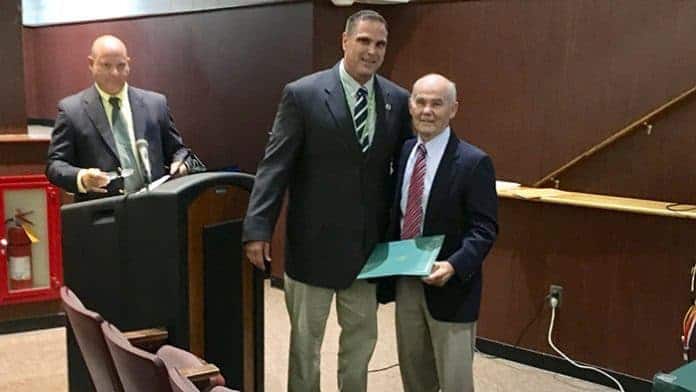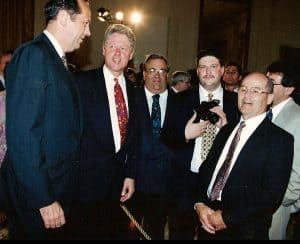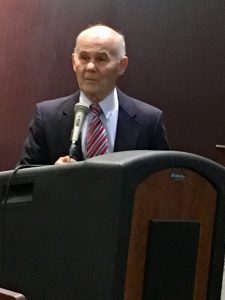
BRICK – A legendary era has ended.
Bob Auriemma, who led the state in career wins as the head coach of the Brick Township High School ice hockey team, has retired.
“Well, I think I put in some time and it’s time for some of the younger guys to take over and utilize their ideas,” said Auriemma, 80. “There was a little twinge when I wrote my letter of resignation (to school officials). I felt it was necessary. You have to make the break at some time and this was a good time. I would like to be remembered as someone who did what was right – or at least tried to do what was right.
“Yes, retiring was a tough decision, but it has to happen at some time. It has to happen at some time. We are between seasons so this was a good time. There are a number of good ice hockey people and coaches available now to take over for me. I appreciate all of the efforts from everyone in the past. That’s the feeling I have. When you retire, it is like one long day and it blurs.”
Auriemma plans to enjoy a busy retirement.
“I think I had more free time when I was working and teaching and coaching,” he said. “Being retired, it seems time just flies by as you try to catch up on things and keep in contact with people. I spend time around my house and with my family.”
The legendary Auriemma said he plans to attend Brick games.

“I will go to them,” he said. “I don’t know what that will be like. The boys will be left in good hands. I will make sure I keep my mouth shut. The team is the responsibility of the new coach. I am sure the team will adapt well to new coaching. I will probably help out with the goalies and such, but only by invitation. The players belong to the coach.”
Auriemma guided the Green Dragons to 729 wins. He coached Brick to six overall state championships, five public school state crowns, four Shore Conference titles and eight Gordon Cup Tournament titles.
“My legs are fine,” he said. “My health is not a problem. Once you learn how to skate, it is like riding a bicycle as you never forget. Part of learning how to skate is learning how to fall forward if you do fall. Once you fall forward, you have your hands to protect yourself. Teaching the kids to fall properly is one of the first things you teach besides the stroke for your skating stride.”
Auriemma coached Brick for 54 years in more than 1,000 games.
“I don’t know how many losses we had because I don’t look back in that direction,” he said with a laugh. “We had some heartbreaking ties. Probably the amount of ties was in the teens.”
The lone head ice hockey coach in school history, Auriemma said two titles stand out the most in his mind.
There was the Gordon Cup Tournament title won when Don Davis put home a rebound with about 40 seconds remaining in regulation in the championship game. It was Brick’s first Gordon Cup Tournament title.
And there was the overtime goal scored by Warren Charles Wolf in the first overall state championship game sanctioned by the New Jersey State Interscholastic Athletic Association. Brick prevailed 3-2 in 1976, besting Chatham Township in overtime.
“When we won the Gordon Cup, it was symbolic of state supremacy,” Auriemma said. “We beat Montclair. Wolf jumped into the play and got the winning goal in the state tournament. To me, those titles are the pinnacle of high school ice hockey in the state. We beat everyone necessary to come out ahead.”
Auriemma said Jim Dowd, who wound up starring at Lake Superior State University and scored a game-winning goal in the playoffs for the New Jersey Devils in 1995 when they won the Stanley Cup, was Brick’s best player. With Dowd in the lineup, Lake Superior State won the NCAA Division I title in 1988.
“We had a number of great players and of course he carried on his career. He was exceptional. He worked hard and did every extra sprint that he could get in. Because he did not come from a supposed major area for ice hockey, I am surprised he went as far as he did, but he had the talent to do it. He was on one of our overall state championship teams (in 1986), played on a national title team in college and played with the Devils when they won the Cup.”

Dowd, who played four varsity seasons at forward, said Auriemma had a large influence on his life.
“He taught you right from wrong and to work hard,” the 1987 Brick graduate said. “He taught you how to do the right thing. He was like a father figure to me. He’s one of the biggest influences on my life. He was a no bull guy and I loved it. He is one of the best human beings I have ever met. He’s a teacher first, then a coach. The second you walked into school, he looked after you. He genuinely cared about everyone.
“I love him. I will do anything for him.”
Auriemma’s work ethic did not escape Dowd.
“He was successful because he showed up each day,” Dowd said. “Each day was a new day and he showed up ready to go to work. I don’t think the guy ever missed a day.”
Dowd enjoyed playing for Auriemma.
“He had a dry sense of humor and was funny,” Dowd said. “He knew when to raise his voice and get on you. He knew when to pat you on the back. He understood that everyone was different. He knew how to criticize each player, but he had the same rules for everyone. He knew when to give you a good tongue lashing. He knew how to press the right buttons so to speak. He did not look back. He looked forward.”
Dowd said Brick was a large draw.
“The games at the Brick Forum were packed,” he said. “Going to ice hockey games was the thing to do in Brick. Hockey was a big part of the community. I loved growing up in Brick. Growing up in Brick, it was all about (being in) the Brick Hockey Club and getting to play on the varsity team when we got to high school. The guys on the varsity were like pros. Everyone growing up wanted to play for coach Auriemma.”
Practices were intense.
“It began in practice,” Dowd said. “It was all about practice. Coach Auriemma never talked about winning and losing. His practices were nothing but hard work and I loved it. The games were so much fun. He was a firm believer in putting in the work during practice and focusing. He believed the results would take care of themselves. We did basic drills with a lot of skating, tons of skating. We were in shape. That’s for sure.
“Coach Auriemma was about the basic fundamentals, hard work discipline and going out there, doing the right thing and playing hockey the right way. It was about playing the right way for the whole length of the ice. He wanted us to be complete players. He stressed doing the fundamentals, the little things, right, and he felt that would make you successful.”
Bonding among teammates and coaches was important to Auriemma.

“It was all about the team concept, which was great,” Dowd said. “I loved that. He treated the players on the team with respect. He wanted the players to treat each other with respect.”
Auriemma stopped short of naming his best team.
“Oh, that’s a tough one,” he said. “It’s really hard. I would hate to say. We had so many great teams in each era. Jim Dowd could always bring us from behind with seven goals. We had so many great teams. I can’t be pinned down. That’s tough. I’m sorry. I can’t. I’m sorry. I have to take a bye on that.”
Auriemma was invited to the White House in 1995 as the first New Jersey high school ice hockey coach to have a former player (Dowd) play for the Devils on a Stanley Cup championship team.
Auriemma and Warren Wolf, the father of Warren Charles Wolf, go back a long way.
Auriemma played football at Memorial of West New York where Wolf was an assistant coach under the legendary Joe Coviello. Auriemma coached football under Wolf at Brick and Wolf led the state in career wins. Wolf founded the ice hockey program at the club level and Auriemma served as Wolf’s assistant coach.
“We just went out there to have fun and do the correct things on the ice,” Auriemma said. “The boys were all anxious to play as ice hockey is a fun game. They took special pride in being able to perform well at it. Most people have difficulty standing up on ice skates.”
Auriemma coached his sons, Tommy and Bobby. Auriemma estimated he coached approximately 19 grandchildren and 14 great grandchildren.
“They gave me good feedback as to whether our drills were going well or not going well,” he said. “They suggested what we should hone in on. They gave me an insight into the game. We always had an easy working relationship with our family members. Ice hockey was ice hockey and home time was family time. If you produced, you played. If you did not produce, you sat.”
The Brick Hockey Club produced numerous Brick players.
“I would say 98 percent of our players came from the Brick Hockey Club and that is just a guess,” Auriemma said. “They were instrumental in developing the talent from a young age. Wolf played in it at either age five or six and wound up scoring the winning goal in the state tournament. The younger, the better as they learn the skills and get used to falling when it is not that big of a deal. They pick up the quirks of the game by watching the older boys play.”

Auriemma tried to improve his coaching at all times, including defeat.
“I tried to learn from the losses at all times and I tried to correct our mistakes in practice if possible,” he said. “They happen. You make a mistake and you don’t want to repeat the mistake. You have to work on the flow in practice.”
Auriemma has seen changes in the game.
“The boys have better equipment,” he said. “The quality of the game has improved greatly over the years. There is a lot of movement away from the puck in terms of stick handling. There is better reaction time. The boys go out for the sport and they know it is a lot of hard work, but they are pretty motivated kids. They just have to get over that learning curve in the very beginning. You can’t brow beat them. You just have to encourage them and I think that has worked well for the boys.”
Auriemma and his wife, Irene, will celebrate their 60th wedding anniversary in October.
“Fortunately, she enjoyed the game of ice hockey and she came to almost all of our games,” he said. “She had as much fun watching as I did coaching. There was a time when she did not know what a hockey puck was. She typed most of my papers (at Colby College where he played goalie in ice hockey) as she was a better typist than I was.”
Auriemma said he enjoyed coaching the Green Dragons.
“All in all, it has been fun through the years,” he said. “I got to see the reactions of the players. I saw how they developed and how much they appreciate the efforts of their teammates and coaches.”
Auriemma hoped to play football at Colby College in Waterville, Maine. However, he began his ice hockey career as a freshman.
“The backfield coach for the football team was the hockey coach and the goalie did not come through to play college so he asked me to play goalie,” Auriemma said. “I said, ‘I can’t skate,’ and he said, ‘I’ll teach you.’ I said, ‘I don’t have skates.’ He said, ‘I’ll give you skates.’ I said, ‘I have a sprained ankle.’ He said, ‘It will heal,’ and I ran out of excuses. So I became the goalie.”
Auriemma taught at Brick from 1962 through July of 2012, imparting lessons in general science, driver’s education, social studies, physics, chemistry, mathematics and United States history. He also taught general classes at the middle school level in Brick. And he sold real estate.






